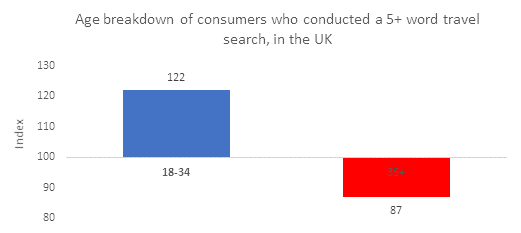Common sense tells us that online searches initiated on mobile devices would tend to be shorter and more concise than those initiated on a desktop.
We consume more quickly on the move, with time and efficiency being of the essence. In this instance, however, common sense would be wrong. Our research found that searches conducted on mobile devices were on average longer than those conducted on desktops.
Mobile devices are becoming increasingly dominant – the average device split is currently 72% for mobile and 28% for desktop, according to our research – and whilst this trend is likely to continue, there’s been little industry research done exploring the differences in length of searches across devices. Understanding why there is such a disparity between device search length is crucial for when brands look to design their engagement strategies.
Base: UK online population who had conducted at one search that resulted in a visit to a travel site between April 10 – May 7, 2016 (Source: Hitwise)
The power of the digital native
So, who is behind these longer mobile searches? Determining the demographic breakdown is the first step toward capitalising upon this mobile trend.
In the UK, for example, those who perform a travel search exceeding four words in length are 22%more likely to be a digital native (those between the age of 18 and 34). This generation, having come of age with the internet and being mobile-first in many regards, is renowned for the ability to discover and find the information they need online in a matter of moments, but how? Part of that may include the tendency to perform longer, more specific searches. This audience has realised that longer searches result in more accurate findings at the first time of asking.
Optimising your marketing strategy for a digitally native audience is a delicate proposal. In 2015, digital natives became the largest share of the workforce in the US and, by 2025, that number will be 76% globally (PEW Research). This group demands personalisation, and experience over simple product engagement. Cracking the millennial code is a crucial factor when brands attempt to capitalise on the dominance of longer, more detailed mobile searches.
Understanding why mobile is the tool of choice
Digital natives are naturally inquisitive, especially in how they interact with brands. The combined influence of predictive capabilities and the rise of question words details why mobile searches tend to be longer. Our analysis found that searches that began with words like “how”, “can”, and “when”, for instance, generally skewed more heavily toward mobile than average. The simple addition of these words to a search query added length to a search.
Predictive capabilities have also played a role in driving search lengths up on mobile devices. In 2013, researchers at Microsoft and the University of Illinois discovered that searches conducted on Bing were longer when conducted on mobile, compared to a desktop device. The authors suggest that auto-suggestion played a large role in shaping this behaviour, and was evidently relied upon to conduct mobile searches.
Is it all about to change?
Mobile keyboards have improved significantly since 2013; however, any threat to the shortening of mobile searches has been addressed by predictive text capabilities, which have once again allowed for more detailed search queries with greater confidence. And this won’t stop; the learnt algorithm continues to improve and learn nuances in key words and expressions shared through conversation meaning the search is becoming longer and more complex.
Voice search, already commonly used by Apple’s Siri, Google Now and Microsoft’s Cortana, may define the next generation of search. The technology is likely to lead to an era of device-less search. Amazon’s Echo and Google’s Home are providing consumers with ways to perform search queries and get information without the use of a screen. As these virtual assistants become increasingly integrated with our daily lives, and consumers become ever-more comfortable interacting with a browser, searches will become even longer and more conversational in tone.
Searches will reflect the way we speak rather than type, leading to a more natural process for searching.
People expect to engage technology in more natural ways than ever before, meaning the small set of previously bought keywords needs to become more comprehensive, intuitive and personalised in order to capture audience attention and serve the right result and the right time. The power of the millennial click will be replaced by a new generation who seek personalisation through speech. According to Google’s mobile voice study, 55% of teens use voice search at least once a day, compared to just 41% of adults.
Marketers should be monitoring this trend closely to ensure they capitalise on the rapidly changing behaviours of their consumers. By knowing how people are searching, marketers can adapt and evolve their strategies to ensure full optimisation for the channel; whether that be a smartphone, smart TV or even a virtual assistant. In the fast-moving world of marketing and tech, the dominant trend is not a champion for long.


